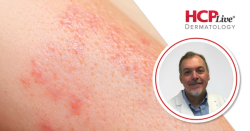
OR WAIT null SECS
FDA Approves Nemolizumab for Individuals with Atopic Dermatitis
This approval announcement by Galderma follows the previous FDA approval of nemolizumab for prurigo nodularis.
An approval by the US Food and Drug Administration (FDA) was announced for nemolizumab (Nemluvio) as a treatment of those aged 12 and older with moderate-to-severe atopic dermatitis that is not adequately treated with standard topical medications.1
The December 14, 2024, announcement follows a prior FDA approval of subcutaneous nemolizumab treatment for adult patients with prurigo nodularis.2 The latest indication is intended to be combined with topical corticosteroids (TCS) and/or calcineurin inhibitors (TCI) among patients with atopic dermatitis.
“Despite currently available treatment options, atopic dermatitis continues to have a massive impact worldwide, with patients not only burdened by intense itch and recurrent skin lesions, but also potentially several associated symptoms including sleep issues, pain, anxiety, and depression,” Jonathan Silverberg, MD, PhD, MPH, professor of dermatology and director of clinical research at the George Washington University School of Medicine and Health Science, said in a statement.1
Atopic dermatitis, an inflammatory disease impacting more than 230 million patients worldwide, is a condition whose most disruptive symptom is often stated to be itch. Nemolizumab is the first monoclonal antibody which is approved to target interleukin (IL)-31 receptor alpha, thus blocking IL-31 signaling and addressing this neuroimmune cytokine’s role in inflammation, itch, and skin barrier dysfunction.
The new FDA approval of the medication was supported by findings drawn from the phase 3 ARCADIA study, designed to evaluate nemolizumab’s safety and efficacy in combination with TCS, with or without TCI, and comparing it to placebo. The trial involved an assessment of 1,728 subjects with atopic dermatitis who were aged 12 years and older.1
Improvements were identified using a set of co-primary endpoints. One such endpoint was the achievement of either full clearance or near-clearance of atopic dermatitis-related lesions based on the investigator’s global assessment (IGA) score. Another was a 75% reduction achievement in subjects’ Eczema Area and Severity Index (EASI) scores.1
When the research team looked at both outcomes, statistically significant improvements were noted following 16 weeks of treatment with nemolizumab compared to those given a placebo. Significant improvements in skin clearance were observed in the ARCARDIA findings, with participants being subcutaneously treated every 4 weeks, alongside TCS with or without TCI.
Additionally, the trials demonstrated significant reductions in itch as early as the first week of treatment, as well as notable improvements in sleep disturbance. The medication was found to be generally well-tolerated, with investigators highlighting a safety profile consistent with that of the placebo arm of the study.
In December 2024, the Committee for Medicinal Products for Human Use (CHMP) of the European Medicines Agency (EMA) provided a positive recommendation for nemolizumab's approval within the European Union.
If it is approved by the European Commission, nemolizumab would become available for atopic dermatitis and prurigo nodularis treatment across the EU and its associated countries.
"I look forward to being able to offer this option to atopic dermatitis patients in my practice who are seeking relief from burdensome itch and lesions," Silverberg said in his statement.
References
- Galderma Receives U.S. FDA Approval for Nemluvio® (Nemolizumab) for Patients with Moderate-to-Severe Atopic Dermatitis. Galderma. December 14, 2024. https://www.galderma.com/news/galderma-receives-us-fda-approval-nemluvior-nemolizumab-patients-moderate-severe-atopic. Date accessed: December 15, 2024.
- Smith T. FDA Approves Nemolizumab for Treatment of Prurigo Nodularis. HCPLive. August 13, 2024. https://www.hcplive.com/view/fda-approves-nemolizumab-treatment-prurigo-nodularis. Date accessed: December 15, 2024.
Related Content:


